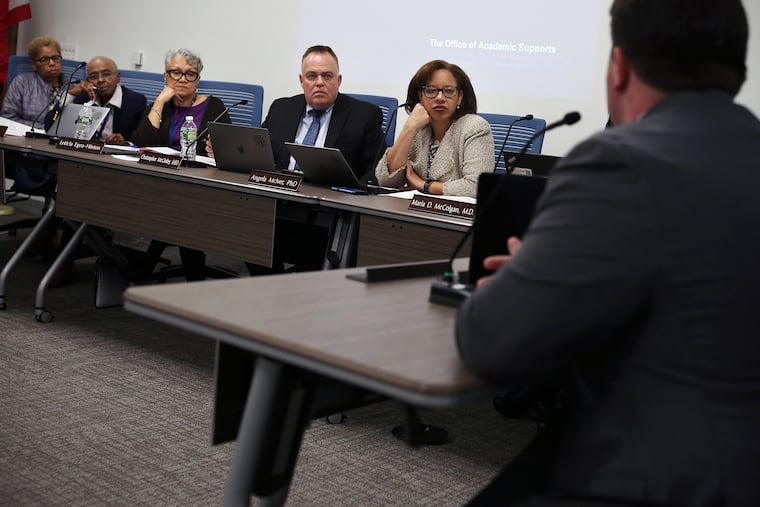Philly Board of Education has done little to change status quo | Opinion
Continuing outsourcing, subsidizing charters, and a lack of public hearings do little restore the public's trust in a board that was created to implement change.

Eighteen months have passed since the Board of Education was restored as the governing body of the School District of Philadelphia. For 17 years, the state-imposed School Reform Commission carried out the corporate reform agenda of closing neighborhood schools, expanding the number and size of privately operated charter schools, eliminating union-held jobs through outsourcing, and ramping up standardized testing, targeting neighborhood schools for charter-ization or permanent closure.
Those who organized the fight to abolish the SRC wanted not just new faces but a new mission — to restore community control and shift the district’s spending priorities from funding edu-vendors to meeting the true needs of the city’s schoolchildren.
District observers acknowledge the commitment that board members have made. A committee process has been established so that the public can offer informed comments on official items before the board votes, in stark contrast to the SRC’s swift voting with little public deliberation. Committee meetings provide a venue for dialogue and actual answers to public speakers’ questions. Board members have visited neighborhood schools and attended community forums. They have met with constituents and worked with district staff to resolve concerns.
But the board’s voting record, especially on budget priorities, shows little change in the status quo. Principal training, staff professional development, curriculum development, and other professional services are still outsourced to groups including TNTP and the Philadelphia School Partnership.
» READ MORE: Philly school board seeks your input on budget process. Here’s how to help. | Opinion
The biggest problem, however, remains the board’s subsidizing of charters that had failed to meet academic standards, even after its own staff recommended nonrenewal. Over the past 18 months, the board has renewed charter schools previously cited for barriers to enrollment, expelling students for minor disciplinary infractions, and violations of city and state ethics.
The board has directed its Charter School Office staff to negotiate privately with schools’ administrators, as if they were clients rather than recipients of public funds. At its December meeting, the board took what amounts to a secret vote when it renewed six charter items while withholding information about the terms and costs involved.
Unlike other Pennsylvania districts, the board held no public hearings to assess these five-year renewals, which represent an estimated hundreds of millions in taxpayer spending. Unfortunately, the board’s actions raise the same questions as did the SRC’s violation of the state’s Sunshine Act, which requires that the public have a chance to weigh in on official action before a vote.
The board withholds provisions of the renewal agreements until after voting is completed. Despite repeated requests from the organization I cofounded, the Alliance for Philadelphia Public Schools, the board has refused to explain why. Imagine the headlines if City Council made secret deals with vendors worth millions but didn’t release the terms of the deals until after the vote.
Philadelphians don’t want a new boss doing the same things as the old boss. When new superintendents take over, they create and carry out a new set of initiatives. This board, as the governing body overseeing a $3 billion annual budget, should do the same.
Scale back standardized testing that squelches creativity and stigmatizes students. Restore support staff — nonteaching assistants, classroom aides, and counselors — lost during the “doomsday budget” years. Bring back certified teacher librarians in fully stocked and functioning libraries. Invest in smaller class size, especially in early grades.
Most importantly, the board must restore public faith in the district that was lost during the years under state control. By shutting out the public on major decisions, the board shuts out its natural allies — the students, parents, educators, and community members who will continue to fight for fair funding for the city’s schools.
Lisa Haver is a retired Philadelphia teacher and cofounder of the Alliance for Philadelphia Public Schools. appsphilly.net